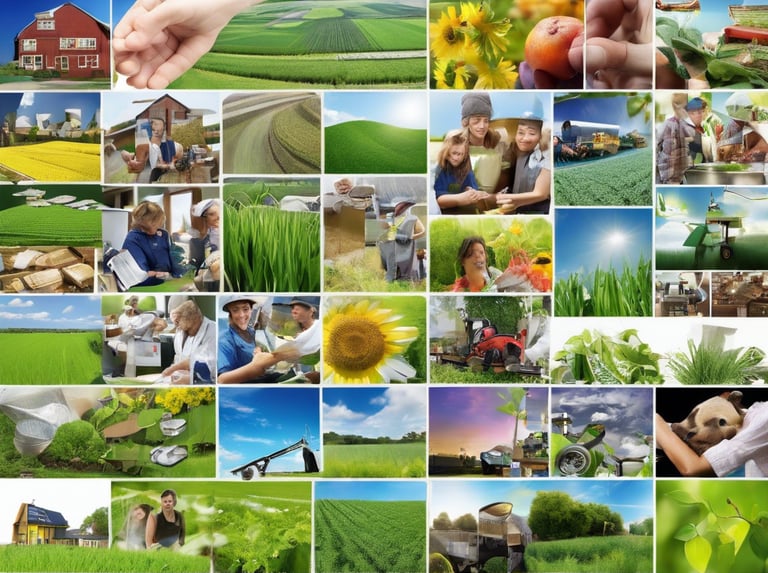WELCOME TO THE WORLD OF IMPACT BUSINESSES
20 Impact Businesses For Micro and Small Enterprises
Explore 20 Impact Business ideas that can be taken up by micro and small entrepreneurs that are profitable.
FEATURED
Vishal Ganeriwal
3/30/20243 min read
An Impact Business blances the outcomes of profit, planet and people.Lets look at twenty examples of Impact Businesses that can be pursued by micro and small entrepreneurs.
1. Eco-Friendly Cleaning Products: Manufacturing and selling environmentally friendly cleaning products made from natural ingredients to reduce chemical pollution.
2.Urban Farming: Establishing small-scale urban farms in collabortion with terrce owners to grow organic produce locally, promoting food security and reducing carbon emissions from transportation. Example grow veggies like tomotoes,cellary,icebergs, spinach,cucumber etc and sell the excess in local marketes
3. Creating Parenting Educational Program: Sustaiable change needs to beging with the young child. Educational course that empower the parents to provide a with child all round skills, attitudes and build robust values will go longway to ahcieve longterm impact. These courses especially those that can be transferred digitally can be profitable too.
4.Upcycled Fashion Boutique: Curating a collection of clothing and accessories made from upcycled or recycled materials, reducing waste in the fashion industry.Example set up a store of garments made only from upcycle and recycle sources, making it easier for customer to locate and buy these products.
5.Community Supported Agriculture (CSA): Operating a CSA program that offers weekly deliveries of fresh, locally grown produce to subscribers, supporting local farmers and promoting sustainable agriculture.
6.Renewable Energy Solutions: Providing installation services for solar panels, wind turbines, or other renewable energy systems to reduce dependence on fossil fuels and combat climate change.
7. Social Impact Consulting: Offering consulting services to businesses and nonprofits on how to integrate social and environmental impact into their operations and strategies.
8. Ethical Beauty Products: Creating and selling cruelty-free, vegan, and ethically sourced beauty products that prioritize sustainability and transparency in the supply chain.
9. Recycling and Waste Management: Launching a business focused on collecting, sorting, and recycling waste materials to eliminate/minimize landfill waste,achieve zero liquid discarge and promote circular economy principles.
10.Green Transportation Services: Offering eco-friendly transportation options such as electric bikes, scooters, or car-sharing services to reduce carbon emissions and congestion in urban areas.
11. Accessible Healthcare Services: Establishing a clinic or telemedicine service that provides trustable, affordable and accessible healthcare to communities.
12. Education Technology (EdTech): Developing educational software or platforms that provide access to quality education for students. This can have a greate impact on longterm development remote or underprivileged areas. Low cost involved in transfer of knowledge from teacher to student at scalable level can make transfer of quality education profitable and affordable.
13.Ethical Fashion Label: Designing and producing clothing lines using sustainable materials, fair labor practices, and transparent supply chains to promote ethical fashion consumption.
14.Clean Food Cafe: Opening a cafe or restaurant that sources ethically, chiemical free ingrdients, supports local farmers, low carbon foot print service style.
15.Green Building and Design: Providing architectural and construction services focused on sustainable building practices, energy efficiency, and green infrastructure.
16. Microfinance Institution: Establishing a microfinance institution that provides small loans and financial services to aspiring entrepreneurs in developing countries, empowering them to start or expand their businesses.
17. Zero Waste Grocery Store: Operating a grocery store that offers package-free and bulk food items, encouraging customers to reduce single-use plastic waste and adopt sustainable shopping habits.
18. Artisanal Craft Cooperative: Creating a cooperative or online marketplace that connects skilled artisans from marginalized communities with consumers interested in ethically sourced and handmade products. Provding fair market access to craftsmen is a great way to empower the artisan community.
19. Sustainable Tourism Operator: Offering eco-friendly tours and experiences that promote conservation, support local communities, and minimize negative impacts on natural and cultural resources.
20. Digital Literacy Training: Providing digital literacy training programs for underserved populations, empowering them with essential skills for participation in the digital economy. This can have a very empowering effect on human productivity
These examples demonstrate the diverse range of impact businesses that small entrepreneurs can pursue to make a positive difference in their communities and the world. Each business has the potential to create social, environmental, and economic value while remaining profitable.


Contacts
mail@impactplusmoney.com
Socials
This 20-minutes test measures you on the usual entrepreneurial traits and mind sets needed to be an effective entrepreneur.
+91 9353269745
Free Assessment Test: Readiness To An Entrepreneur
Free Assessment Test: Readiness To Start An Impact Business
This 10-minute test measures whether your priorities and attitudes are aligned to start an impact business.
